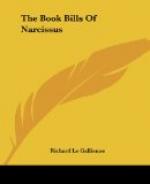AN ACCOUNT RENDERED BY RICHARD LE GALLIENNE
WITH A FRONTISPIECE BY ROBERT FOWLER
1895
TABLE OF CHAPTERS
I. Introductory
II. Still introductory, but this
time
of A greater than
the writer
III. In which narcissus opens his ‘Gladstone’
IV. Accounts rendered
V. An idyll of Alice sunshine, which
really belongs
to the last chapter
VI. The sibylline books
VII. The children of Apollo
VIII. George Muncaster
IX. That thirteenth maid
X. ‘In Vishnu-land what
avatar?’
TO MILDRED
Always thy book, too late acknowledged
thine,
Now when thine eyes no earthly
page may read;
Blinded with death, or blinded with the
shine
Of love’s own lore celestial.
Small need,
Forsooth, for thee to read my earthly
line,
That on immortal flowers of
fancy feed;
What should my angel do to stoop to mine,
Flowers of decay of no immortal
seed.
Yet, love, if in thy lofty dwelling-place,
Higher than notes of any soaring
bird,
Beyond the beam
of any solar light,
A song of earth
may scale the awful height,
And at thy heavenly window find thy face—
know my voice shall never
fall unheard.
December 6th, 1894.
Note.—This third edition has been revised, and Chapter V. is entirely new.
CHAPTER I
INTRODUCTORY—A WORD OF WISDOM, FOUND WRITTEN, LIKE THE MOST ANCIENT, ON LEATHER
‘Ah! old men’s boots don’t go there, sir!’ said the bootmaker to me one day, as he pointed to the toes of a pair I had just brought him for mending. It was a significant observation, I thought; and as I went on my way home, writing another such chronicle with every springing step, it filled me with much reflection—largely of the nature of platitude, I have little doubt: such reflection, Reader, as is even already, I doubt less, rippling the surface of your mind with ever-widening circles. Yes! you sigh with an air, it is in the unconscious autobiographies we are every moment writing—not those we publish in two volumes and a supplement—where the truth about us is hid. Truly it is a thought that has ‘thrilled dead bosoms,’ I agree, but why be afraid of it for that, Reader? Truth is not become a platitude only in our day. ‘The Preacher’ knew it for such some considerable time ago, and yet he did not fear to ‘write and set in order many proverbs.’
You have kept a diary for how many years? Thirty? dear me! But have you kept your wine-bills? If you ever engage me to write that life, which, of course, must some day be written—I wouldn’t write it myself—don’t trouble about your diary. Lend me your private ledger. ’There the action lies in his true nature.’




